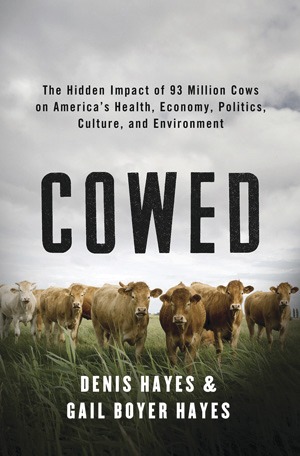A thoughtful presentation of the negative impacts of domesticated cows, "Cowed: The Hidden Impact of 93 Million Cows on America's Health, Economy, Politics, Culture and Environment" evokes fear, anger, awe and amazement. Next month, W.W. Norton & Co. is publishing the 377-page book by Denis Hayes and Gail Boyer Hayes.
Denis is president of the Bullitt Foundation, a nonprofit devoted to environmental health. He is also an ENR Top 25 Newsmaker for masterminding the Bullitt Center, the nation's first super-sustainable speculative office building (ENR 1/23 p. 28).
The Hayes' quiet rant does rattle, stating myriad problems caused by meat and dairy production and connecting the dots. But it also presents solutions to cows' "heavy hoofprints" on almost every major environmental problem. "We want to keep cows around," say the authors.
"Cowed" is full of scary facts about the cattle industry's negative impacts on aquifers, soil and the air.
A 2013 U.N. report found that livestock account for 14.5% of human-caused greenhouse-gas emissions. "Eating a pound of beef has a greater climatic impact than burning a gallon of gasoline," says the book.
The solid and gaseous waste from 93 million U.S. cows is not regulated. "Feed production and processing, the fermentation that goes on inside cows and the decomposition of cow manure release three warming gases: carbon dioxide, methane and nitrous oxide."
Cows are water hogs. One study cited says that each cow consumes more fresh water than any other animal. Two factoids: On average, Texas cows use 68 gallons of water each day; a Starbucks Frappuccino requires 300 gallons of water, mostly for cream.
Rather than just causing the reader to have a cow, "Cowed" offers solutions. However, the way out of the human-caused cow quagmire is not easy.
For starters, a cow's diets can be changed to reduce emissions of warming gases. Farms can implement—or be made to implement—better soil and water conservation practices. Shifting to perennial crops and regenerative agriculture, among other actions, can help stem pollution. Reducing meat consumption also can help.
The authors draw in the reader with almost everything he or she could want to know about cows but didn't think to ask, from their ancestry to cow lore.
Beyond meat and dairy, the book delves into the countless cow by-products society depends on. Cow-ear hair is used to make artist and calligrapher brushes, for example.
The narrative is also a personal one, sprinkled with anecdotes about the authors' journey into cowdom, including the note that Gail's mother had her mitral valve replaced with one made from a cow's pericardial tissue.
Some may think the building, manufacturing, power and transportation sectors are the big culprits regarding climate change. "Cowed" makes a case for a different kind of action to stem environmental poisoning. It certainly cowed me.
This article was updated on Feb. 27, 2015.



Post a comment to this article
Report Abusive Comment